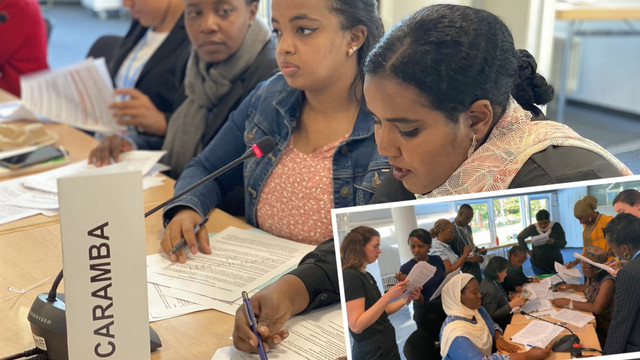Climate action: let’s be bold in Bonn
As the UN climate change conference kicks off in Bonn on Monday, Subhi Barakat calls for negotiators to be bolder and braver with an emphasis on action.


Former LDC Group chair Giza Gaspar-Martins, left, discusses the formulation of the Paris Agreement with IIED's Achala Abeysinghe, right, at COP21 (Photo: Matt Wright/IIED)
Sometimes a reality check is long overdue. On my way to Bonn for the UN climate change negotiation session, which starts on Monday, I had the usual chit-chat with my taxi driver. After all these years it’s still hard to explain what we do at these sessions in a way that doesn’t sound pretentious or delusional.
Because while it’s hard to knock the effort of so many of us trying to do our part to save the world from climate change, aside from a mountain of decisions under the UN climate change regime, after 25 years of negotiations we have relatively small wins to show.
Maybe it’s time to reflect not just on outcomes but also on our approach.
In a recent issue paper, Gebru Jember Endalew (former chair of the Least Developed Countries (LDC) Group) and I took stock of the political and technical landscape after the Katowice Conference of the Parties (COP24) in 2018. We’ve tried to be pretty frank about what the global community needs to do over the next few years, starting at this Bonn session.
Rethinking ambition and success – speedily
For starters, we need to rethink how we consider ambition and define success.
The new benchmark for success has to be limiting warming to 1.5°C or better. If the recent IPCC 1.5°C special report tells us anything, it’s this. Of course, LDCs and Small Island Developing States (SIDS) are all too familiar with the worst impacts of climate change and have known this for a long time.
But keeping temperatures to at most 1.5°C above pre-industrial levels by 2100 will need some serious long-term planning. The problem is that people don’t typically think long term because for 99% of the history of human civilisation we’ve been accustomed to thinking day-to-day, month-to-month and, at most, year-to-year – quintessential short-termism.
Our governments and businesses suffer from the same shortcoming, usually planning in five- to 10-year cycles. Thinking in timeframes that approach a human lifetime, let alone two or three lifetimes, just isn’t what we’re used to or good at.
That’s why we’ve been so terrible at considering how our actions will affect future generations; whether what we are doing now is fair or dangerous for our children and grandchildren. It's why, for example, we’ve been unable to curb our fossil fuel addiction even though we know it will change the climate for generations to come.
If there’s ever been a time for humankind to learn a new skill, it’s now. And the skill? Serious, long-term thinking.
And then there’s the importance of early and bold action. The emphasis is on action and turning the ambition in our rhetoric into results on the ground (and in our atmosphere).
Taking the train from Edinburgh to Bonn to attend #UNFCCC meetings. Journey time 13 hours 17 minutes. Flight would have been only 1 hour and 50 mins. Through my return journey, I am saving 0.15 tons of CO2 equivalent. All my team @iied doing the same. #guiltfreetravel @UNFCCC
— Achala C. Abeysinghe (@AchalaC) June 10, 2019
Until we do that, we’re still mostly beating our chests and talking big, without getting our hands dirty. But the UN Secretary-General’s Climate Action Summit in September 2019 provides a sparkling opportunity to take a leap forward in ambition and action.
Every country can use the summit to make a speedier transition to a low-carbon and climate-resilient society. Although not easy, the longer we wait, the narrower our options will be when the climate crisis and its impacts get worse.
Pursuing priorities – two big topics
And so we find ourselves in Bonn for another technical negotiation session. The big-ticket item at the meeting will be the guidance for using (Article 6) market mechanisms under the Paris Agreement, which nearly broke the Katowice COP last December.
The bottom line has to be ensuring environmental integrity when using these mechanisms or else the Paris Agreement goals could become unachievable. So negotiators have to avoid creating loopholes because, once open, they’re almost impossible to close (for example, “hot air” in the system – a surplus of units that lets countries meet their targets without doing much – is very hard to take out). The Kyoto Protocol experience taught us this if nothing else.
LDCs and SIDS also see an opportunity in Bonn to make headway on loss and damage – addressing impacts that can’t be adapted to – with negotiators looking to hammer out how to review the work of the Warsaw International Mechanism. And looking ahead, the focus has to shift from simply learning and talking about loss and damage to helping countries address it.
Bonn will cover other issues, but for LDCs these are the top two priorities.
Being honest and getting real
Crucially, our decisions have to be based on science and the best information available – a repeat of the COP24 stand-off around the IPCC special report will only diminish the dwindling credibility of the UN process.
The UN climate change regime needs to set the highest bar for action with serious commitments and effective rules for addressing climate change. All of us involved in the negotiations haven’t fully delivered on that promise (yet) and we really aren’t making the leaps we need to make – but we can do better by thinking long term and being bold!



